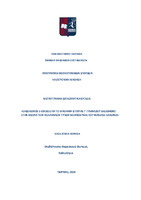Σχεδιασμός e-course για το μάθημα Ιστορίας Γ’ Γυμνασίου βασισμένο στη θεωρία των πολλαπλών τύπων νοημοσύνης του Howard Gardner

Προβολή/
Λέξεις κλειδιά
Πολλαπλές νοημοσύνες ; Howard Gardner ; Engagement ; e-Learning ; Weebly ; Ιστορία Γ΄ ΓυμνασίουΠερίληψη
Today, despite advances in educational technologies offering various possibilities in the learning process, traditional teaching methods continue to persist, resulting in a dull presentation of instructional contents and the one-sided development of each student.
In order to promote the holistic development of each student and their engagement in the learning process, an e-course was designed on the internet for third-grade high school students, with the aim of the Weebly tool. The primary theoretical model on which the orchestration was based was Multiple Intelligences theory of Howard Gardner's along with the strategies it advocates, during the educational process. The teaching subject utilized was the History of the third grade, as literature review indicates that students show the least interest towards this subject due to its sterile and tedious teaching methods, hindering their active participation.
The research carried out investigated not only the impact of applying the theory of Multiple Intelligences upon all the intelligences that each student possesses, but also, it examines the influence of this theory on three axes of Engagement, such as Participation, Collaboration, and Emotional Engagement.
The study was implemented on a small sample of 14 third-grade secondary school students who attended the course for four weeks. Pre-test and post-test questionnaires and rubrics were used for data collection. Through qualitative and quantitative analysis of the data collected in the initial and final phases of the process, there is an increase only in Linguistic, Logical/Mathematical, Visual/Spatial, Kinesthetic and Interpersonal Intelligences after the completion of the course, while students' engagement increased overall in all three axes tested examined.


